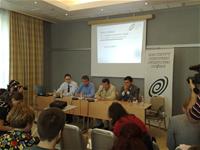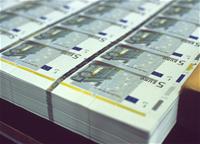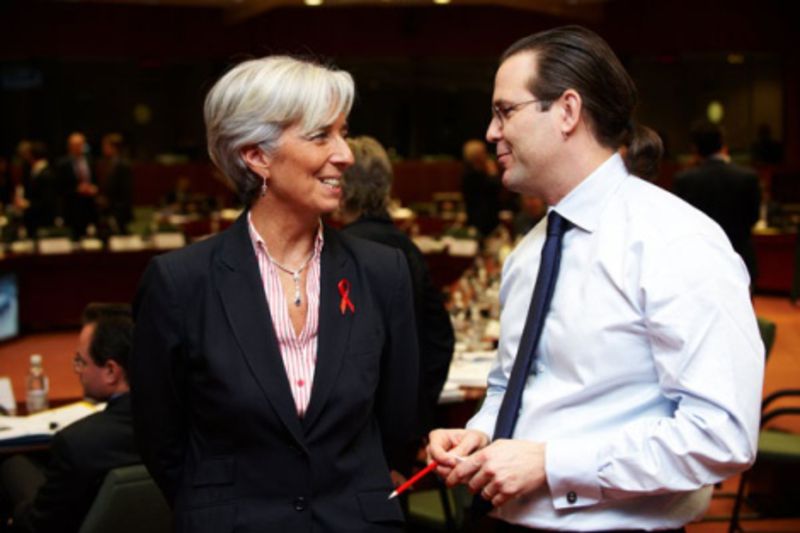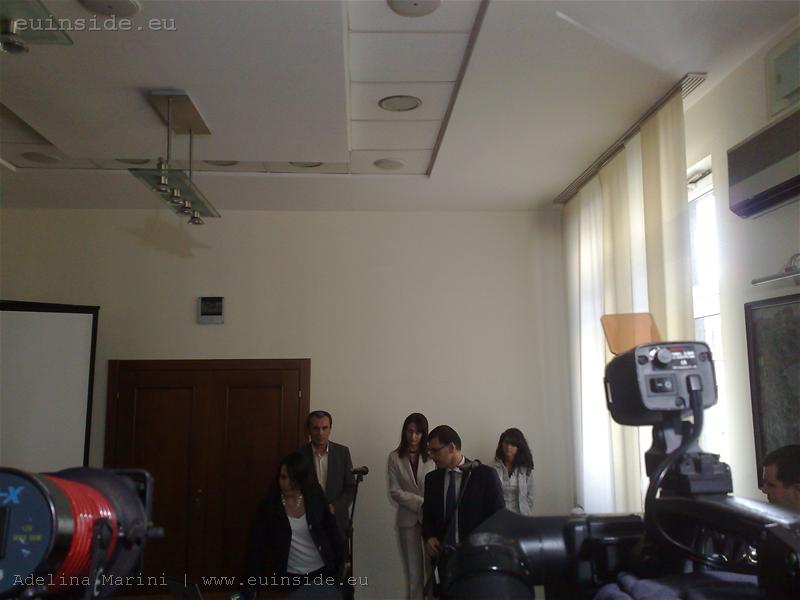Raisng of taxes would be a big mistake, warned leading Bulgarian economists
Adelina Marini, July 2, 2009
 Raising taxes in a moment of crisis would be a big mistakes, warned leading Bulgarian economists at e meeting for the 12th anniversary of the introduction of the currency board in Bulgaria. "If the taxes are being raised in a moment when the labour market and the corporate sector is under great pressure, this would increase further the burden over the economy and, in fact, the state instead of taking its own responsibility and balance the budget, it will transfer more burden over the private sector and the labour market which means more unemployed, less economic activity and, therefore, - larger budgetary problems", explained the senior economist from the "Open Society" institute Georgi Angelov.
Raising taxes in a moment of crisis would be a big mistakes, warned leading Bulgarian economists at e meeting for the 12th anniversary of the introduction of the currency board in Bulgaria. "If the taxes are being raised in a moment when the labour market and the corporate sector is under great pressure, this would increase further the burden over the economy and, in fact, the state instead of taking its own responsibility and balance the budget, it will transfer more burden over the private sector and the labour market which means more unemployed, less economic activity and, therefore, - larger budgetary problems", explained the senior economist from the "Open Society" institute Georgi Angelov.
His colleague from "Industry Watch" Lachezar Bogdanov reminded that when the ex-socialist prime minister Zhan Videnov raised the taxes he had, actually deepened the crisis. The his government raised the VAT from 18% to 22% and introduced an export tax as an instrument to balance the budget and stabilize the situation. "We remember what happened, this was April or May 1996 - the export fell more, the income to the budget dropped significantly, the deficit rose and the hyperinflation reached record levels", said Lachezar Bogdanov.
On Saturday the "Capital" weekly published the promises (in written) of most parties in the economic field. All of them stated that there will be raising of taxes. the BSP (Bulgarian Socialist Party of the prime minister Sergey Stanishev) and the DPS (Movement for Rights and Freedoms, a coalition partner of the socialists in the ruling coalition) intend to increase the VAT and the excises, GERB (Citizens for the European Development of Bulgaria of the Sofia mayor Boyko Borisov) will raise the profit tax. The Blue coalition stated they will not publicly announce any raising of taxes but the ex-prime minister Ivan Kostov (1997-2001) proposed the introduction of a new tax that would help farmers to guard their fields.
The leading Bulgarian economists Georgi Angelov, Georgi Ganev (programme director of the Centre for Liberal Strategies) and Lachezar Bogdanov recommended also the politicians to be careful in their statements about any possible agreement with the IMF. They said that given the acute need and, otherwise good consensus for doing reforms, most parties announced that they will conclude an agreement with the Fund so that the IMF could take the role of the "bad cop" and to take all the negatives of the painful reforms. But they noted that there is definitely no need of an agreement with the Fund. Georgi Angelov added that it would not be a good signal for a country because it will show that it cannot cut its own expenses and is ready to rely on foreign experts to do this instead of the government.
Lachezar Bogdanov warned that the IMF has never so far poured money into the real economy. He said that the parties use the upcoming elections to call for an agreement which could finance companies in trouble but this has never and nowhere been done so far. Georgi Ganev said that all calls for an IMF agreement are directly related to the calls for removal of the currency board. These calls are coming from people that have a direct interest in the depreciation of the local currency (lev) because thus they will return much less money than they have withdrawn as credits.
And regarding the confidence in the Bulgarian banking system in general, Georgi Ganev doesn't find any drama in the fact that most credits and deposits are now in euro. He said explained  that this is due to the closer integration of Bulgaria to the Eurozone and the EU, especially from the business point of view. The large share of deposits in euro is in fact an overnight deposit of the business. And the credits in euro are a signal of the nervousness of the banks which is absolutely comprehensible, Mr. Ganev said, because the confidence in the currency board has nothing to do with the lack of liquidity. And because there is a lack of liquidity, the interest rates are still very high in Bulgaria, added the programme director of the Centre for Liberal Strategies.
that this is due to the closer integration of Bulgaria to the Eurozone and the EU, especially from the business point of view. The large share of deposits in euro is in fact an overnight deposit of the business. And the credits in euro are a signal of the nervousness of the banks which is absolutely comprehensible, Mr. Ganev said, because the confidence in the currency board has nothing to do with the lack of liquidity. And because there is a lack of liquidity, the interest rates are still very high in Bulgaria, added the programme director of the Centre for Liberal Strategies.
The economic experts used the 12th anniversary of the currency board to remind that it is a proof that when there are reforms people approve them and the confidence if the citizens is high, unlike the unreformed sectors like the education and healthcare. "That is why the currency board is bad for the politicians and good for the citizens and the economy", concluded Lachezar Bogdanov.
The economists vigorously explained the situation with the budget deficits. The key question is in what time the government is making a budget deficit, said Lachezar Bogdanov - "when you can finance it with foreign loans or when you can't? If there is a lack of liquidity and the credit rating of your country is falling, there is uncertainty and you cannot finance". Georgi Angelov added that generating budget deficits might lead to the "Latvian" scenario in Bulgaria because markets would think that here something bad is going on. He warned that if the government would avoid going on red in the next 1-2 months, it must urgently start planning further cuts for some 1.4-2.2 bn lev (700 mn - 1.1 bn euro).
 "The total balance of payment is negative in the months where we have large deficit spending. Another factor which has negative influence is the reduction of the minimal reserves of the banks in October, December and January. But the main negative factor over the balance of payment is the budget. When in December the government decided to spend a large part of the budgetary surplus, the balance of payment immediately went red", explained further Georgi Angelov and pointed out that in February and March there were also deficits. "The outside trade imbalances do not exist for themselves, they are caused by the actions or lack of actions of the government", Mr. Angelov added.
"The total balance of payment is negative in the months where we have large deficit spending. Another factor which has negative influence is the reduction of the minimal reserves of the banks in October, December and January. But the main negative factor over the balance of payment is the budget. When in December the government decided to spend a large part of the budgetary surplus, the balance of payment immediately went red", explained further Georgi Angelov and pointed out that in February and March there were also deficits. "The outside trade imbalances do not exist for themselves, they are caused by the actions or lack of actions of the government", Mr. Angelov added.
 | © Consilium
| © Consilium | © euinside
| © euinside